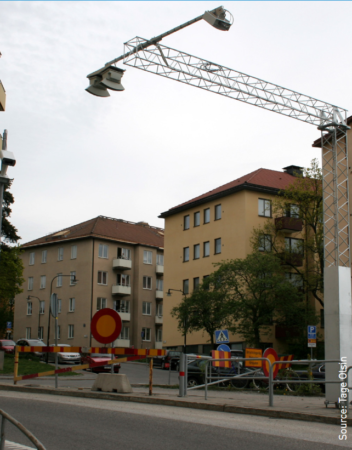The congestion pricing report
Seattle's Congestion Pricing Report looked at ten different schemes that could reduce the volume of cars in congested areas, from variations on a toll, to bans on non-electric or non-autonomous vehicles, to allowing only certain license plate numbers on a given day.
 Stockholm Cordon Toll (Tage Olson, via SDOT)
Stockholm Cordon Toll (Tage Olson, via SDOT)After considering environmental impacts, congestion reduction, equity, and feasibility, SDOT ended up with four alternatives:
- Cordon Pricing, which charges drivers for crossing a boundary into a sensitive area (like Stockholm);
- Area Pricing, which adds a fee for driving around within the cordon in addition to the boundary toll (like London);
- Fleet Pricing, which tolls a particular type of vehicle fleet, like commercial vehicles, or taxis and taxi-like services (like New York is planning); and
- a "Road Usage Charge" that " restrict[s] access to a zone to vehicles enrolled in a RUC program that levies a per-mile charge," kinda like the WSDOT pilot for a vehicle-miles-traveled (VMT) tax.
Additional equity analysis suggested that variable tolling, with an exemption, and a focus on spending the proceeds on transit and "vulnerable communities" was the option that put equity first. Frank observed that the report didn't offer any drawbacks to Fleet Pricing, uniquely, and suggested it as "an interim step." So perhaps we're headed for an "Uber tax" in the medium term.
As a matter of policy, that's defensible. Taxi-like services are most likely to truly compete with transit for trips where transit does really well - like peak trips into and out of downtown Seattle, where there would be a toll. Transit trips that don't involve downtown are noticeably less convenient, and therefore more likely to happen in a car. Broadly speaking, taxis are good when they discourage car ownership and bad when they pull people off of transit.
On the other hand, shielding often wealthy people who drive into downtown while making it harder for gig-economy workers isn't an obviously equitable way to proceed. Nevertheless, the optics of making "big corporations" pay to reduce congestion may carry the day.